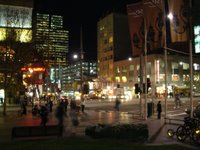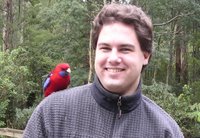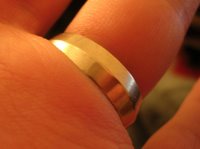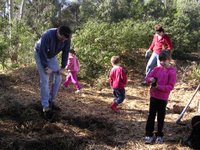 Ok ok ok ok ... I've been REALLY excited about this all week, and have been waiting to write about it until after we did it. "It", in this case, is National Tree Day, the Australian version of Arbor Day, where everybody takes a day to remember the environment.
Ok ok ok ok ... I've been REALLY excited about this all week, and have been waiting to write about it until after we did it. "It", in this case, is National Tree Day, the Australian version of Arbor Day, where everybody takes a day to remember the environment.Because Liz and I finally have a TV, we occasionally watch the news. During the commercials, an organization called Planet ARK was trying to promote a partnership they'd formed with Toyota to plant over 1 million trees on tree day. And I thought, perfect - we should do this.
And so we did.
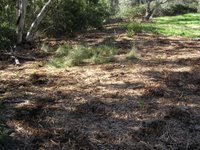 Mimos, at the last minute, changed our plans for a service and instead spent two hours planting over 300 saplings, grass plantings, and other small plants in an area down in Thornbury. Then we went and had lunch.
Mimos, at the last minute, changed our plans for a service and instead spent two hours planting over 300 saplings, grass plantings, and other small plants in an area down in Thornbury. Then we went and had lunch.Planting was fantastic - the weather was beautiful (60 degrees and not a cloud to be seen), the foliage plentiful (as I said, 300 plantings), and the mulch slightly damp (when is it not?).
I'm not sure why I was so excited about this. It's possible that it has something to do with the fact that it was partially my idea to get everybody over to Thornbury to do this. But I think it has more to do with the fact that I've gotten a sense that Christians have lost touch with their mandate to be caretakers of this world. I think we all get that it's ok to use the resources. What we don't get is that those resources were entrusted to us as a gift, and we are supposed to use them responsibly.
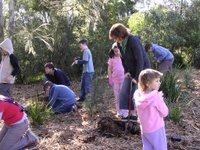 We are symbiotes with this world, and what we do to it is done to us in return. While I'm excited that I got to give an idea that worked, I'm more excited about the gusto with which our small church planted all those seedlings. They got REALLY into it! All the kids were filthy by the time it was all over, but - and I love this - they were closely tailed by the adults. Dirt was everywhere; and so were smiles.
We are symbiotes with this world, and what we do to it is done to us in return. While I'm excited that I got to give an idea that worked, I'm more excited about the gusto with which our small church planted all those seedlings. They got REALLY into it! All the kids were filthy by the time it was all over, but - and I love this - they were closely tailed by the adults. Dirt was everywhere; and so were smiles.Mimos, I'm proud of you guys. Today was a good day.
Then I saw a new heaven and a new earth; for the first heaven and the first earth had passed away ... And I heard a loud voice from the throne saying, "See, the home of God is among mortals. He will dwell with them; they will be his peoples, and God himself will be with them; he will wipe every tear from their eyes. Death will be no more; mourning and crying and pain will be no more, for the first things have passed away." And the one who was seated on the throne said, "See, I am making all things new."


